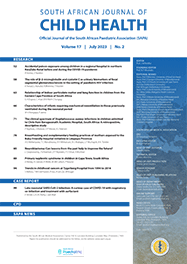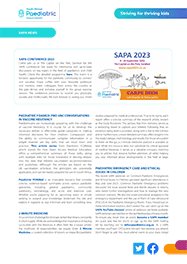Research

Dilemmas of telling bad news: Paediatric palliative care providers’ experiences in rural KwaZulu-Natal, South Africa
Abstract
Background. In general, the principles of palliative care suggest that, at some stage, patients should be given ‘bad news’ about poor illness prognosis. The information is often important for care planning, especially when it involves disclosure to children. Although there are ongoing debates about whether to tell or not to tell children bad news, these debates have largely been informed by patients who live in a developed-world context. In contrast, this paper focuses on telling bad news to children and their families from a rural, developing-world context.
Objective. The objective was to analyse the experiences of providers of palliative care to children when they attempted to fulfil one of their roles as palliative caregivers, i.e. to prepare patients and families for a child’s poor illness prognosis.
Method. This was an exploratory study that was approached qualitatively. Five nurses and eight home-based care workers who provided palliative care for children in rural areas of South Africa formed a purposive, information-rich, self-selected sample. Data were produced through discussions with participants, using photographs taken by the caregivers to stimulate and contextualise the discussions.
Results. Participants experienced four dilemmas with regard to telling bad news: when families did not want to be told any bad news; when participants felt uncomfortable about telling bad news; when participants and patients shared dissimilar values about telling bad news; and when participants were unsure about when to tell bad news.
Conclusion. In the rural areas where the study was conducted, children are not usually given bad news about their illness. Disclosing poor prognosis led to the dilemmas faced by caregivers. The result was that the emotionally charged work of caring for children reaching the end of their lives became more challenging for the caregivers because they were not prepared for cultural complexities. In view of the findings of this study, there is a need for ongoing research into paediatric palliative caregiving in context.
Authors' affiliations
Laura Mary Campbell, School of Clinical Medicine, University of KwaZulu-Natal, Durban, South Africa
Nyna Amin, School of Education, University of KwaZulu-Natal, Durban, South Africa
Keywords
Cite this article
Article History
Date published: 2013-08-30
Article Views
Full text views: 6064

.jpg)



Comments on this article
*Read our policy for posting comments here